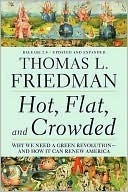Take a photo of a barcode or cover
11 reviews for:
Hot, Flat, and Crowded 2.0: Why We Need a Green Revolution--and How It Can Renew America
Thomas L. Friedman
11 reviews for:
Hot, Flat, and Crowded 2.0: Why We Need a Green Revolution--and How It Can Renew America
Thomas L. Friedman
This book was incredibly well-written and very informative. If there's any aspect of the financial crisis or climate change that you don't understand, it's in here- so get yourself educated. In 2013, some of the information seems a bit dated coming from 2009- it would be great to get a new edition or another book on the topic (it does look like Friedman wrote another book in 2011 in collaboration with two other writers, I'll have to check it out). I'm sure there's a left bias to this book- more conservative thoughts on climate change are presented as being backwards. But I guess that's the argument we're up against anyway in the world of politics. How else can we present the information without sounding liberal- we're suggesting a revolution and dramatic change in the way our country works.
Many people would rather have a root canal than read a non-fiction book about economics, especially one that doesn't paint a glowing picture of the future.
Hot - the result of global climate change. Flat - the world is not becoming literally flat, of course, but geographical features that once assured isolation, like mountains and oceans, are ever more easily surmounted. Crowded - seven billion people and growing.
If you are one of many who've recently sweltered through an unusually hot spring, summer, or fall, consider how much less pleasant it will be if/when our ancient, outdated power grid can't support all our electrical needs, and we have more and more rolling blackouts, with no air conditioning or even ceiling fans to move air around.
Yes, that is the direction we are headed. Sounds grim, and it could be, but there are plenty of ways that particular future can be averted.
It starts out quoting The Onion, about American's propensity to buy cheaply made crap from China. Crap that quickly breaks and thus must be replaced, and being Americans, we can't seem to stop ourselves from consuming even more crap.
The book doesn't just present arguments and statistics, but uses lots of anecdotes to illustrate and drive the points home. The first half of the book presents the problem; the second half offers solutions. The style is easy to read, and the arguments are compelling.
Hot - the result of global climate change. Flat - the world is not becoming literally flat, of course, but geographical features that once assured isolation, like mountains and oceans, are ever more easily surmounted. Crowded - seven billion people and growing.
If you are one of many who've recently sweltered through an unusually hot spring, summer, or fall, consider how much less pleasant it will be if/when our ancient, outdated power grid can't support all our electrical needs, and we have more and more rolling blackouts, with no air conditioning or even ceiling fans to move air around.
Yes, that is the direction we are headed. Sounds grim, and it could be, but there are plenty of ways that particular future can be averted.
It starts out quoting The Onion, about American's propensity to buy cheaply made crap from China. Crap that quickly breaks and thus must be replaced, and being Americans, we can't seem to stop ourselves from consuming even more crap.
The book doesn't just present arguments and statistics, but uses lots of anecdotes to illustrate and drive the points home. The first half of the book presents the problem; the second half offers solutions. The style is easy to read, and the arguments are compelling.
slow-paced
informative
slow-paced
challenging
informative
slow-paced
Very redundant throughout but solid thesis
I started reading this book, and then had to go back and start again because I found so many things that I wanted to underline. Which is saying something because, as a general rule, I hate hate hate underlining in my own books. But with this book, I couldn't not do so.
This edition has been substantially edited, especially in the first few chapters, because of events happening since the book was first published - the Great Recession, Obama's election. This book, along with others (Michael Pollan's for example), has opened my eyes to just how damaging my lifestyle is. Mine, and ours as a society. Every mile we drive puts a gallon of carbon dioxide in the air. And the developing countries are going to outstrip us in pollution. For the time being, the world looks to the US to lead. We need to start doing it.
Just a few of the things I've underlined:
- "The events of September 11, 2001, brought on another fit of American schizophrenia. On the one hand, those events pulled us together as a nation, for a while, and on the other hand they disconnected us from the world and from some of our core instincts as a nation. September 11 knocked us off our game, prompted us to pull in, to export more fear than hope, to build walls rather than windows, and to devote enormous amounts of money and energy to homeland security rather than nation-building at home."
- "At the same time, the election of Ronald Reagan in 1980 ushered in an age in which we told ourselves we did not have to sacrifice anymore for a better way of life."
- "As the Cold War receded further and further into our rearview mirrors, a kind of 'dumb as we wanna be' attitude took over our political elite, a mood that said we can indulge in petty red state-blue state catfights, can postpone shoring up our health care system and our crumbling infrastructure, can postpone addressing immigration reform, can postpone fixing Social Security or Medicare or dealing comprehensively with our environmental excesses - as long as we want. Partisan divides all but guaranteed that we could not solve any of these big multigenerational problems anymore, and post-Cold War lassitude told us we didn't really need to care."
- "Our parents' generation mortgaged their future so our generation could get educated. In too many cases our generation mortgaged its future to buy homes we could not afford and possessions we did not need."
- "Alas, we are not just the people we've been waiting for. We are the people we have to overcome. We have been consuming too much, saving too little, studying too laxly, and investing not nearly enough. And our political institutions are also the institutions we have to overcome. As long as our political systems and Congress and Senate seem incapable of producing the right answers to big problems, as long as our politicians can only behave like Santa Claus and give things away, and never like Abraham Lincoln and make the really hard calls, the greatness that America is capable of will elude it in this generation."
- "It is way too early to predict how President Obama's administration will turn out. But it is not too soon to say that his mere election is hugely important. It represents America's extraordinary capacity for renewal. It says that our country still has the ability to change course, to start afresh, to begin anew - to literally reinvent itself to a degree that most other nations can only dream about."
This edition has been substantially edited, especially in the first few chapters, because of events happening since the book was first published - the Great Recession, Obama's election. This book, along with others (Michael Pollan's for example), has opened my eyes to just how damaging my lifestyle is. Mine, and ours as a society. Every mile we drive puts a gallon of carbon dioxide in the air. And the developing countries are going to outstrip us in pollution. For the time being, the world looks to the US to lead. We need to start doing it.
Just a few of the things I've underlined:
- "The events of September 11, 2001, brought on another fit of American schizophrenia. On the one hand, those events pulled us together as a nation, for a while, and on the other hand they disconnected us from the world and from some of our core instincts as a nation. September 11 knocked us off our game, prompted us to pull in, to export more fear than hope, to build walls rather than windows, and to devote enormous amounts of money and energy to homeland security rather than nation-building at home."
- "At the same time, the election of Ronald Reagan in 1980 ushered in an age in which we told ourselves we did not have to sacrifice anymore for a better way of life."
- "As the Cold War receded further and further into our rearview mirrors, a kind of 'dumb as we wanna be' attitude took over our political elite, a mood that said we can indulge in petty red state-blue state catfights, can postpone shoring up our health care system and our crumbling infrastructure, can postpone addressing immigration reform, can postpone fixing Social Security or Medicare or dealing comprehensively with our environmental excesses - as long as we want. Partisan divides all but guaranteed that we could not solve any of these big multigenerational problems anymore, and post-Cold War lassitude told us we didn't really need to care."
- "Our parents' generation mortgaged their future so our generation could get educated. In too many cases our generation mortgaged its future to buy homes we could not afford and possessions we did not need."
- "Alas, we are not just the people we've been waiting for. We are the people we have to overcome. We have been consuming too much, saving too little, studying too laxly, and investing not nearly enough. And our political institutions are also the institutions we have to overcome. As long as our political systems and Congress and Senate seem incapable of producing the right answers to big problems, as long as our politicians can only behave like Santa Claus and give things away, and never like Abraham Lincoln and make the really hard calls, the greatness that America is capable of will elude it in this generation."
- "It is way too early to predict how President Obama's administration will turn out. But it is not too soon to say that his mere election is hugely important. It represents America's extraordinary capacity for renewal. It says that our country still has the ability to change course, to start afresh, to begin anew - to literally reinvent itself to a degree that most other nations can only dream about."
This book is not a quick read by any means; I actually needed the entire summer to read it. It can also be a bit repetitive at times and all of the same information probably could have been presented in a significantly smaller amount of pages. However, the information within is definitely worthwhile. As an environmental science major, I discovered this book by reading excerpts from it in three different classes. I figured it was relevant and decided to read the whole book. I do appreciate the "sober optimism" Friedman displays while presenting the hard facts and figures of where the world stands in terms of renewable energy and green technology. He also presents convincing arguments as to why America needs to step to the line in these industries sooner rather than later. I really wish that every politician and policymaker would take a moment (or in my case, a summer) to read and digest the valuable information in this book.
Hey, I have to read this. I loved the World is Flat. I don't agree 100%, but this guy makes one think. I like that he is appraochable in this thoughts, ideas, and communication and he gets people talking.
A good book, although a bit dense. I really felt like I should have been taking notes on it, because there is so much information in it. The book is accessible, but definitely not a beach read. I took off a star because I felt like it was long-winded at times and repetitive.
But oh my goodness, this book will put honest to goodness fear in you and make you see what a glorious energy revolution we could be having. Hopeful and disappointing.
At this point the book is a few years old, so it is a little dated, but (unfortunately) not too much has changed since then.
Bottom line: Recommended, but there may be a newer book of equal quality out there. Otherwise, a safe pick for sure.
But oh my goodness, this book will put honest to goodness fear in you and make you see what a glorious energy revolution we could be having. Hopeful and disappointing.
At this point the book is a few years old, so it is a little dated, but (unfortunately) not too much has changed since then.
Bottom line: Recommended, but there may be a newer book of equal quality out there. Otherwise, a safe pick for sure.






